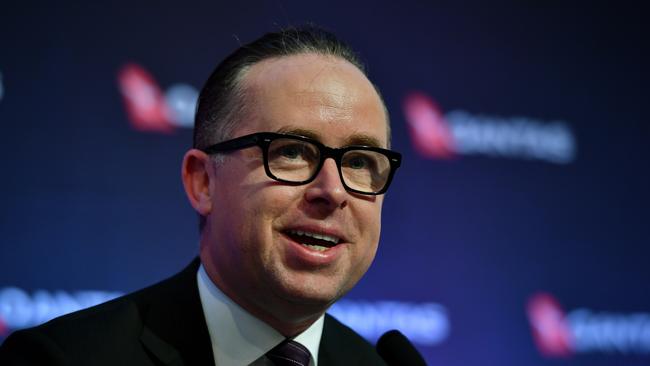Company tax bill shows Alan Joyce is playing to Qantas strengths
Qantas’ first company tax bill in the best part of a decade is both good and bad news for the airline.

Qantas paid $4 million in company tax last year, its full-year results revealed; its first corporate tax bill since 2009 and only the second time in Alan Joyce’s tenure that company tax has been paid by the airline.
That fact underlines the path the Qantas has followed to today’s record profit.
The company has paid around $3 billion in stamp duty and other taxes, but a combination of losses and depreciation charges and the like have meant Joyce has not spent a lot of money on company taxes.
That also tells you, no matter what the logic is in favour of lower corporate taxes, how hard it is for business leaders like Joyce to advocate for company tax cuts.
On a day when Canberra politics is dominating the news, Joyce has produced an outstanding profit, with a 22 per cent return on capital.
On a day when the Coalition government is imploding in leadership turmoil, business was getting on with life.
And in fact, on the evidence of the numbers from Qantas, Stockland et al, it’s doing okay in spite of the lack of leadership from Canberra.
Yet the market is concerned at how Joyce will pay for the $690 million increase in fuel costs to $3.9 billion this year and after outperforming the market by 20 per cent since February, the stock price was this morning down 6 per cent, at $6.31 a share.
Next week, when John Borghetti unveils his Virgin profit numbers, the blue sky in the sector will be evident with domestic capacity shrinking, if anything, in the face of increased demand.
Borghetti is on his way out after eight years rebuilding the airline and halving leverage, while Joyce came to the party today with 98 years of history behind him and over 80 per cent of the industry’s profits from less than 65 per cent market share.
Virgin has two headhunters searching for a replacement for Borghetti, Russel Reynolds and Kok Kong Chan’s Maritana Partners.
Qantas planes are still operating on only 78 per cent capacity domestically, so they are not all full, even after Joyce has done little things like shrinking the kitchen on the main 737 workhorses operating between Sydney and Melbourne.
This has added an extra six seats to the planes.
Last year the airline shifted course internationally by letting Emirates take the European routes, with Qantas taking more via Singapore.
This will save it $80 million a year, through savings on lounges in Dubai, making more use of the lounges in Singapore , more control over the passengers on the route rather than losing custom to Emirates. Benefits likes this will help pay for this year’s fuel bill.
The $400 million in so-called transformation savings will also help.
Joyce was adamant that increased costs would not be a problem, so you figure he has it covered.
Qantas’ loyalty program saw earnings before interest and tax edge up slightly to $373 million, but the strength of the brand is shown by the 7 per cent increase in Qantas credit cards, in an overall market which saw card issuance fall by 4 per cent.
Leveraging the brand more will see further expansion in financial services this year.





